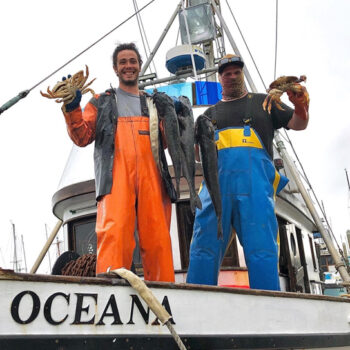Top photo: Harrison Ibach and his freshly caught live Dungeness crab.
The COVID-19 emergency has devastated the commercial fishing industry and changed the seafood industry, perhaps forever. But one silver lining in this crisis has been seeing the revitalization of direct sales of seafood, and sharing the fish that I catch with my Northern California community.

The crew of the F/V Oceana proudly display their catch, for sale to the public right off the boat at Woodley Island Marina in Eureka, California
I own and operate the F/V Oceana, and my home port is the Woodley Island Marina in Eureka, California. I fish for Dungeness crab and hook-and-line caught groundfish, which provides a high-quality product and fetches a premium over other gear types. And I love it. The fishing way of life, the ability to run my business on my own terms, and the opportunity to sustainably harvest our incredible marine resource to feed people. Those are the forces that motivate me to get up each morning and keep going.
Fishing groundfish and crab in Northern California is a lifestyle that is based on risk, but fishermen like me and my colleagues take on risks knowing the boundaries, the “known unknowns.” We’re pretty good at it, despite the danger.
When our state closed its economy in March, I was selling virtually all of the fish I landed to the restaurant market. So was everybody else. But when nearly every restaurant selling our fish suddenly closed, I had no market for my product. Processors weren’t interested in moving hook-and-line rockfish at a price to match high quality and low volume, and boutique buyers couldn’t afford to send a truck to rural Humboldt County to move our catch to urban markets closer to what few buyers that remained. The overnight upheaval of the industry was a risk that very few of us had ever contemplated.
These drastic market shifts presented me and my family with a choice: do we tie up the boat and ride it out, hoping for a disaster check that may never come, or do we adjust?
And similar to the risks of pandemic, the rewards of making big changes and pivoting to solely sharing local seafood with our community brought rewards that we couldn’t have possibly imagined.
My incredible wife Cerise and I started a new business: Oceana Hooknline Seafood, selling everything my crew and I catch off of H Dock at Woodley Island, just a short drive from downtown. We jumped through the permitting hoops and put the word out on social media, took a deep breath and crossed our fingers, and went out to sea.
We started small to test the waters, but it turned out that we didn’t need to: we sold every fish and crustacean we caught on the first day. On the next trip: the same. And the next. And the next. Every single fish that I’ve been able to catch was brought home to feed a family. And it’s enabled me to feed mine, and the families of my crew.
I’ve been amazed at the outpouring of support for local seafood from my little city, and the areas around it. People have come from as far as three hours away and stood in line in the rain for another hour to partake in their share of the ocean’s bounty that we provide to them. Our customers come to tell their stories, and to hear ours. I’m proud to be able to tell people how we go to sea, where we drop our gear, and how we catch their dinner. My customers get to meet the people who provided them with their healthy meal, and they learn what it takes to keep a small family seafood business afloat. And every single one of them has told me how much they appreciate being able to buy fish this way. I now have dozens of repeat customers, and some new friends too.
Without my community’s support, driven by passion for knowing where one’s food comes from and people’s love of the freshest seafood on the planet, we might not have survived this fishing season. But this is the way the seafood business should be, and it’s been a long time coming.
As restaurants reopen and things start to get back to normal, I’m sure that there will be buyers looking to move hook and line caught fish in the restaurant market. I’ll be happy to sell to them. But I know that direct sales, enabling me to share my rockfish, lingcod, black cod, Dungeness crab, and more with my neighbors, is going to be a permanent part of my business going forward.
It’s the same all across the West Coast, and it’s a national phenomenon. So ask yourself, when was the last time you went down to the dock to buy seafood straight from the person who caught it, or bought from a market that could tell you the name of the fisherman and boat who landed it? If it’s been a while, give it a try again. You’ll be supporting a fishing family like mine, and you’ll be sharing in the maritime heritage and sustainability ethics that make our nation’s fisheries strong.



When is the best time to come for snapper?